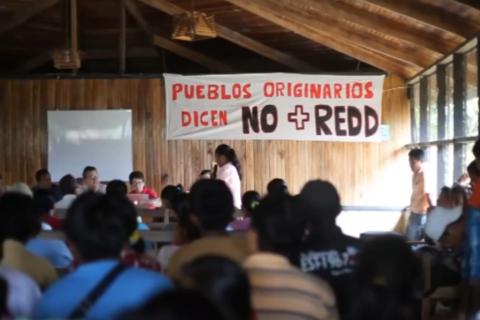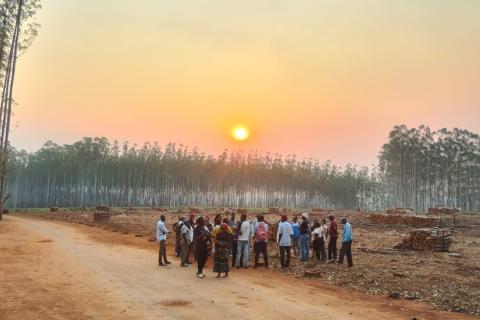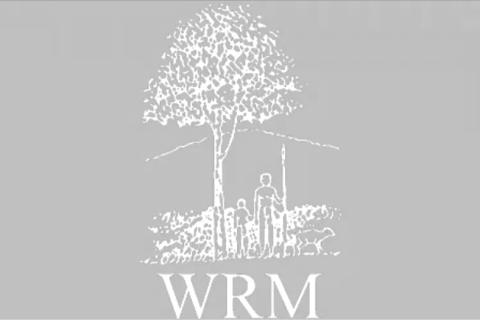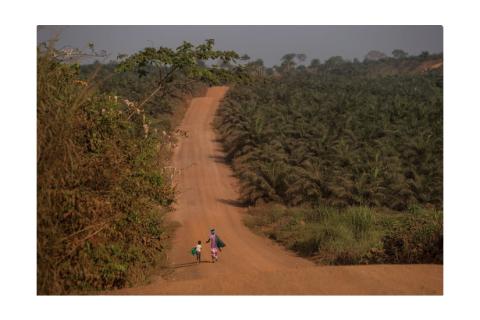The government of the Brazilian state of Pará – host of the COP30 climate conference – introduced an annual “Week of Awareness on the Importance of Carbon Credits”, the Indonesian government sets up a “Seller meets buyer” sales booth for carbon credits at the COP. These are the more visible signs of climate talks that are more concerned about creating business opportunities than halting the climate crisis.
Bulletin articles
The Tropical Forest Forever Facility (TFFF) is hailed as big new idea to finance forest protection. Launch during the UN climate conference in the Amazon city Belém, hundreds of organizations across the Global South have rejected it as another idea that reinforces capitalist-colonialist oppression and exploits the debt burden of the Global South.
“We know these projects are not truly green. When turbines come, birds will vanish. When mines come, dust will cover schools and homes. When forests are seized in the name of the government’s ‘forest reclamation policy’, the poor lose everything”, explains a Kham Pa Lai community grassroots organization that is resisting extractive industry projects.
Costa Rica presents itself as a global pioneer in implementing Jurisdictional REDD+, and it advertises this as a success. However, indigenous communities denounce coercion on the part of the state, which makes acceptance of this initiative a condition for it to invest in health or education. In this article, a member of the Bribri people talks about their struggle.
Tired of living surrounded by eucalyptus trees, communities from the provinces of Zambézia, Manica and Nampula are raising their voices against the occupation of land by companies such as Portucel Mozambique – which has prevented these communities from farming, accessing water, and living a dignified life. They are now demanding the return of their land and respect for their rights.
More than 50 organizations, movements and communities from around the world have come together to endorse the Declaration of Women Against REDD and Carbon Markets.
The annual UN climate conference “has in fact become a negotiation more concerned with how much money each country thinks it might save or grab in the short term than about finding true solutions to a real problem”. The observation from the WRM bulletin editorial “Our Expectations for the Climate Change Convention's COP6” feels strikingly relevant 25 years on.
A recent report on the transnational corporation SOCFIN – owned by the French group Bollore and the Hubert Fabri family of Luxembourg – exposes the sexual violence, expulsions of local populations, and the contamination suffered by communities living around rubber and oil palm plantations. Socfin is an agri-food company with operations in 10 countries in the Global South. It controls approximately 380,000 hectares of land where it grows oil palm and rubber trees on an industrial scale.
This bulletin shows that the fight against monoculture tree plantations and the model they represent is very strong in the Global South, especially among women. Whether it is in Indonesia, Thailand, Liberia, Brazil or Colombia, communities continue to resist and make progress.
We are peasants from Indonesia, the world’s largest producer of palm oil. In recent decades, we have witnessed the spread of oil palm monocultures in our territory, an expansion driven by multinational companies with government support. False promises led us to accept plantation partnership schemes that put us at risk of losing our land. What was once forest and traditional crops have been replaced by monocultures that have left us with food shortages, debt, and the threat of floods. For this reason, we organized ourselves to end this exploitation and restore our traditional way of life. And here we share the story of our struggle.
This is the story of how we, a group of indigenous peoples and peasants in Colombia, have come together under the name Cajibío Interethnic and Intercultural Territory of Life (TEVIIC, by its Spanish acronym), to face one of the world's largest multinational paper and cardboard manufacturers: Smurfit Westrock. Our goal is to achieve Agrarian Reform through autonomy and concrete actions.
Whether they are in Brazil, amidst eucalyptus plantations, or in Thailand, surrounded by oil palm plantations, women suffer specific impacts from these monocultures. Women are on the frontlines of the resistance to these projects, which exploit and devastate the land in pursuit of profit. This is what two peasant activists fighting to defend the land – one from Brazil and one from Thailand – tell us.










